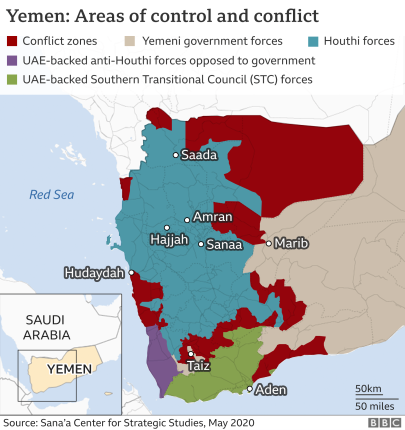Bombs Away - Deja Vue
Friday, February 2, 2024
Written by Laurence F Sanford, Senior Analyst ASCF
Categories: ASCF Articles
January 30th, 2024 - Bombs away in Houthi-controlled Yemen.
The United States and the United Kingdom have begun bombing Houthi-controlled Yemen in retaliation for missile/drone/boarding attacks against ships in the Red Sea.

How did bombs away work out in Vietnam, Iraq, and Afghanistan? The U.S. military controlled the skies and the seas, won every major battle, and yet lost all three wars. Political incompetence, a lack of will-to-win strategy by the American elite, and limited support by the local population led to these defeats. The Marxist communists and Islamic jihadists won the wars with a strong belief in the cause, ruled by ruthless and capable leaders, and supported by outside organizations and countries.
The U.S. military is now fighting in Yemen with incompetent military leadership and incompetent political leadership against Islamic enemies with the will to win, ruthless leadership, and support from other Islamic organizations and countries, most notably Iran. This will not end well for America and Western Civilization.
Are Americans supposed to believe in our military and political leadership:
● After Vietnam, where over 50,000 Americans died? The U.S. Air Force dominated the skies and dropped more bombs on Vietnam than were dropped on Germany in World War II. Yet North Vietnam was able to continue because the Washington elite was afraid to take out ships from the Soviet Union and China supplying military equipment.
● After the shameful Afghanistan withdrawal? No generals were fired or resigned during or after the debacle. American leaders betrayed commitments to our allies and soldiers. Billions of dollars and thousands of lives were lost.
● After thousands of soldiers were forced to leave military service with years of loyal duty because they refused to be injected with unproven COVID-19 vaccines? Physically fit young people were not statistically endangered by the virus.
World trade and the economy are being dramatically affected by the Houthis, a small group of Islamic jihadists acting as proxies for Iran, who control northern Yemen. They have declared war against Israel for responding to the Hamas atrocities committed on October 7, 2023, when Hamas murdered, raped, and tortured over 1,200 Israelis and captured over 200 hostages.
The Houthis have not only declared war against Israel but Western Civilization and all countries that support Israel. The Houthis are a member of the Iranian-supported “Axis of Resistance,” which includes Hamas, Hezbollah, and militias in Iraq and Syria. Their basic agenda is anti-America, anti-Israeli, and anti-Western Civilization.
Freedom of the seas should be a cause that unites the world. All countries are affected by shipping companies changing their routes from the Red Sea and Suez Canal to around the Cape of Good Hope in South Africa. It adds two weeks to delivery times and increases fuel/labor costs. The diversion has led to the following:
● Shortage of shipping containers
● Increased food and energy costs
● Factories shutting down due to parts shortages
● Political instability
● Higher greenhouse gas emissions
Egypt’s revenue from the Suez Canal was over $700 million monthly before the Houthi attacks began. Revenue is now down 40%. Egypt and most other Muslim countries are hesitant to condemn or take action against the Houthis because it means they are supporting Israel, and this would create public backlash. Muslims worldwide celebrated the slaughter, torture, and rape of Israelis by Hamas on October 7.
Saudi Arabia, for two decades, waged a war backing the central Yemen government against the Houthis. It backed off after the Houthis attacked Saudi oil refineries with missiles and drones, and the U.S. offered no support. Now, the Saudis are in negotiations with the Houthis and do not want to disrupt relations with Iran.
China has not condemned the attacks even though they affect Chinese businesses and customers. China has a military presence in the region but is doing nothing to stop the missile attacks. Undermining U.S. leadership and its role in the Mideast is China’s goal.
Summary
The Houthis’ declaration of war against Israel and the West is Islamic Jihad in action. The attacks will not stop until the Houthis are eliminated from power and Iran is stopped from providing missiles and support.
The world is rapidly evolving into a “1984” world of warfare in a “clash of civilizations.” Now is the time to identify friends from foes.
China and Russia support the Mideast turmoil and Islamic terror as this undermines the U.S. Chaos is a friend to Marxist totalitarianism.
Action
1. Provide military aid to the central government of Yemen for it to win the ongoing civil war against the Houthis.
2. Institute an air and naval blockade on ALL shipping to and from Houthi-controlled Yemen.
3. Encourage Egypt, Saudi Arabia, and the Gulf States to join in efforts to stop Houthi attacks.
4. Ally with all countries willing to support the above efforts.
5. Do not send in U.S. ground troops.
Peace Through Strength!
Laurence F. Sanford
Senior Analyst
American Security Council Foundation











